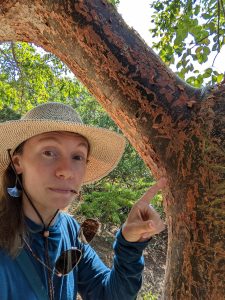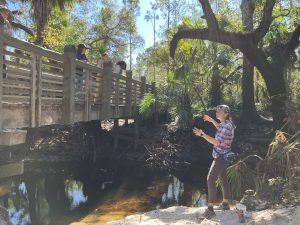
Alyssa Vinson is a certified arborist and one of three UF IFAS urban forestry extension agents. We met to discuss her work, experiences, and her vision for Florida’s urban forest. Alyssa focuses on understanding and uplifting the connections between people and nature. Alyssa’s educational journey started a little differently than many in our field. During our chat, Alyssa shared, “I started my undergraduate education as a creative writing major with hopes of being a ‘starving poet’ but quickly changed to focus on environmental science.” She holds a master’s degree in forestry specializing in ecological restoration. Currently, she is working on a doctoral degree in interdisciplinary ecology.
Engaging residents, municipalities, and arborists
A key focus for her work in Hillsborough County includes facilitating workshops and fostering opportunities for genuine professional connection and growth. “Development pressure and shifting climate zones are two major challenges in urban forestry in my region,” said Alyssa.
Some of the major projects she leads include organizing and developing materials to support tree management in homeowner association (HOA) led communities, working with tree and landscape response after hurricanes, and the general stewardship of trees. Her work with HOAs is particularly poignant. For many new developments, trees are frequently planted where they do not match the site conditions, leading to problems as they mature. Alyssa described that these trees could conflict with infrastructure like sidewalks. She also mentioned, “Trees planted through my region are facing environmental stresses from shifting climate, making some species better suited than others.” Considerations for species diversity are critical to her work and collaborations with municipal governments, HOA boards, community groups, and individuals working to manage tree canopies and planning for new planting. By diversifying tree species and planning for changing conditions, urban forestry management can support the long-term resilience of our cities’ landscapes.
This last year, storms greatly impacted the Tampa Bay area. Much of Alyssa’s work centers on addressing restoration after these storms. She described how this storm season included more instances of tree failure, large branch loss, many tipped over or lost smaller trees, and the landscape experienced large-scale defoliation. “In an attempt to assess the needs of my community and the broader region, I initiated a survey for southwest Florida assessing tree and landscape damage and perceptions of trees before and after the storms,” said Alyssa.
Working together to pursue a well-managed urban forest

For Alyssa, the future of urban forestry includes equitable, diverse, and well-managed practices. Urban forests need to meet community needs and receive recognition as valuable resources. Alyssa believes that urban forestry serves as an avenue for improving a community’s quality of life. “Urban forestry is focused on a system that includes people; you can’t tease out one from the other. If the urban forest is diverse, healthy, and equitably distributed, all communities will benefit from the wealth of ecosystem services provided … but also from the social and emotional well-being associated with green spaces,” said Alyssa.
Alyssa collaborates with other extension agents to develop reference materials, workshops, statewide initiatives, and other resources to work smarter together. One of the ways she supports these collaborations is through her podcast, Cultivating Curiosity. She hosts this podcast with fellow extension agent, Dr. Taylor Clem (Nassau County). You can listen to the podcast on the first Friday of each month.
Connect with Alyssa and learn more on her author page: https://blogs.ifas.ufl.edu/manateeco/author/alyvinson/
 5
5
